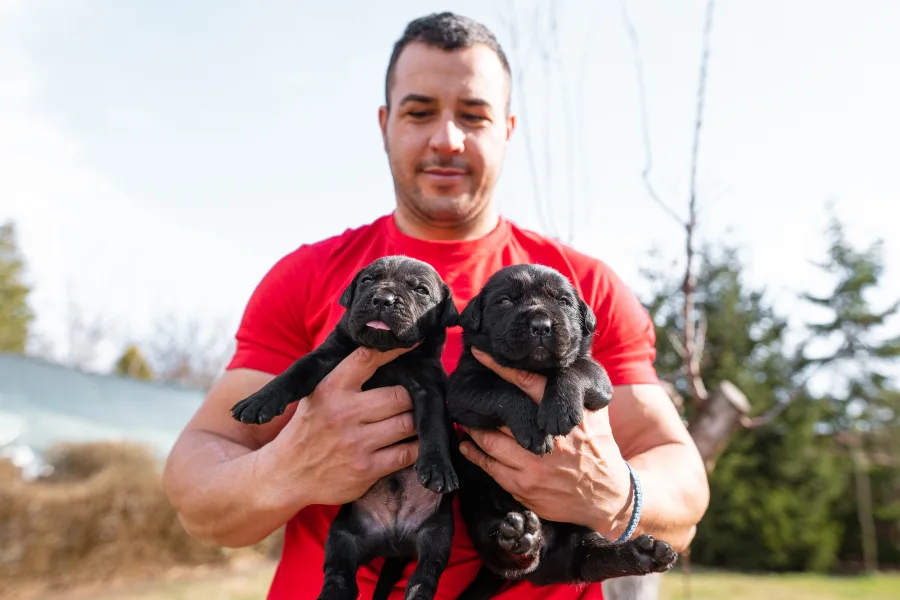In the early 1950s, professors and zoologists J. P. Scott and J. L. Fuller developed a program of research on dogs that concentrated on the impact that genetics and early stages of life have on the puppy’s later social behavior.
In 10 years, based on 450 dogs, their research confirmed that: The first 12 weeks of the puppy’s lives and how well they are guided and socialized by the breeder and the owner in this period has a major influence on their later social behavior.
Genetics plays a role, but Scott and Fuller learned that even the most genetically gifted puppy doesn’t reach its maximum potential without that early life encouragement. In order for the puppy to fully develop, it is necessary to treat them in a certain way from an early age.
If you are a Cane Corso breeder, or you are about to become a Cane Corso owner, you need to have in-depth knowledge and understanding of how to handle your puppy in each stage of its development. All this is explained in the stages of puppy development below…
From Birth to the Third Week
For the first three weeks after birth, the mother takes care of the puppies herself. She can feed a normal litter of six to ten puppies with her milk without complications.
In many cases, the mother has very little milk in the first 36 hours after giving birth. That milk is essential for the puppies at this stage as it has all the necessary supplements to nourish and protect the puppies from infective diseases. If the mother is not producing enough milk you need to supplement feed the puppies.
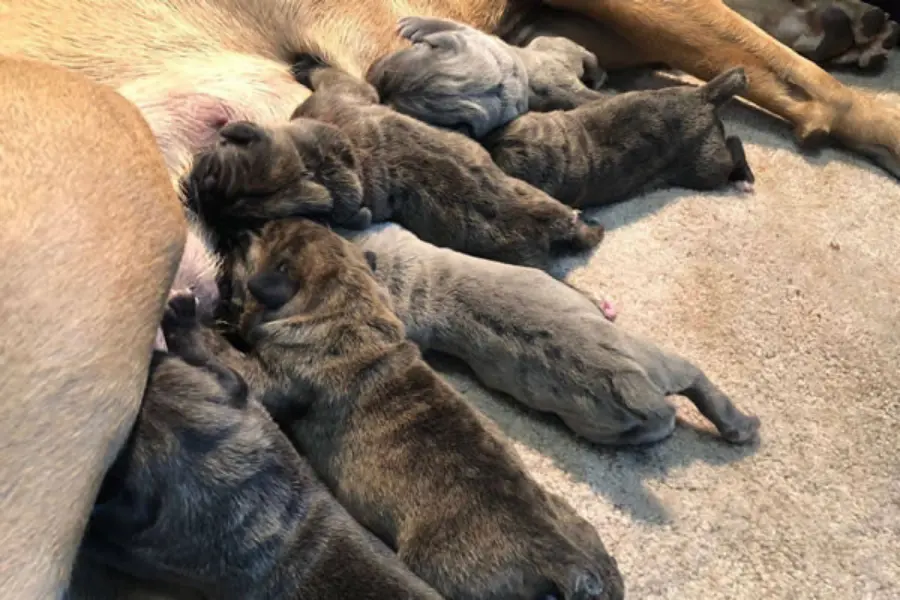
Each puppy must be measured daily, at the same time if possible. The pups often maintain their weight for the first two days. But from the second day, their weight must increase. In my experience, they should gain about 100-130 grams a day from the third day of life. Every puppy stagnates or losses a little weight during the first 48 hours.
An old Cane Corso breeding rule says that puppies should double the weight they had at birth on the eighth day of life and that at 3-weeks, they should double the weight they had on the eighth day.
Apart from the daily weight gain, A sure indicator that the mother’s milk is good and sufficient is the behavior of puppies. If the pups suck calmly and contentedly cling to their mother, everything should be fine. In contrast, constant whining and crawling around is a sign of unhappiness and hunger.
Conclusion of The First Stage:
In this first period after birth, the puppy’s activity consists of sleeping, sucking, and pooping, nothing more. Therefore the first three weeks the puppies only need warmth, food, and sleep. And all of that is provided by their mother(apart from the cases where the puppies need supplementation).
In this stage, you need to take good care of the mother and provide her with everything she needs, and with that, you are essentially taking care of the puppies as well.
From the Fourth to the Seventh Week
The Fourth Week
When puppies enter the fourth week of life, or when they turn 22 days old, all their senses start to work normally, and they absorb information from their environment.
You will notice that your pups will startle when you quickly move an object towards them, or how they will drop down on the floor when they hear a loud sound, or turn towards it.
Since their senses are now suddenly awakened, and their surroundings affect them strongly, don’t overload the puppies by trying to teach them or train them anything this week. Just ensure that their environment is safe and undisturbed, so they can calmly take in all this new information they are getting through their senses and nerves.
*Don’t separate the puppies for longer than an hour at a time from the litter.
*If you have little kids that want to play with the puppies, make sure they don’t overdo it.
The weaning process should begin at the beginning of the fourth week. Since pups’ teeth are growing, it becomes uncomfortable for the mother to nurse them. The mother may start to pull away before the puppies are full.
To help accustom the puppies to food other than their mother’s milk, you will separate the mother from the puppies for half an hour, two to three times a day, to try eating solid food.
According to PetMD, puppies’ first food should be puppy mush/gruel. Initially, make gruel by mixing good quality puppy food soaked in water with a milk replacer.
- 2 cups of puppy food
- 2 cups water
- 12.5 ounces of puppy milk replacer
These amounts just represent a ratio you should use, adjust the actual amounts to the size of your litter.
It can take puppies up to 3 days to adjust to this new food. As the days go by, you should gradually decrease the amount of moisture and increase the dry or canned food. By the age of 6 weeks, the puppies should be eating dry food with little or no moisture.
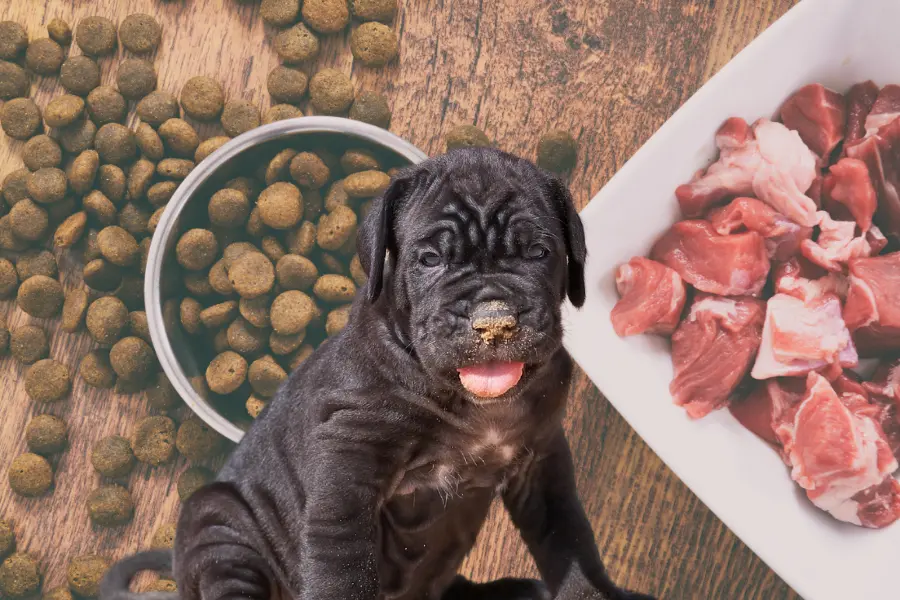
I have to say that I don't like this idea of feeding puppies "chewed up" food. I am sure that these foods are of high value, easily digestible, and not harmful, but I don't want my little pups to get used to mushed food. I want them to adjust to the food they will be eating their entire life.
For the first meal, I feed my pups pure beef tartare without any additives. I lightly steam the meat and serve it to them while it's warm. I feed them the same the next day. On the third day, I add kibble to the meat. I keep adding more and more kibble each day until 1/3 of the meal is kibble.
When they have 5 to 6 weeks, I start supplementing their meals with vitamins and minerals by adding: carrots, peas, green beans, sweet potatoes, broccoli, apples, bananas, pumpkin, fish oil, etc.
From this moment on my dog's meals look like this:
50% Meat
30% Kibble
20% Fruits and Vegetables
*I feed my pups 3 times a day in this period.
*I don't feed my dogs completely raw, most times i lightly steam the meat.
*Sometimes I add bone broth and fish oil to my dog's meals.
From the Fifth to the Seventh Week
On the twenty-eighth day begins the period of awakening and the constant increase of attention to all external stimulation. The brain has developed so much that it has become capable of learning.
The pups are ready to learn. Never in their later life will they be more susceptible to learning than now. Everything they get used to in these weeks will be deeply imprinted in them and will stick for the rest of their lives, and everything that they don’t adapt to now will be uncomfortable and hard to accept later.
*Be careful not to create any undesirable habits because they will be firmly ingrained.
After the fifth week, the desire and ability to learn are steadily increasing day by day. At the same time, socialization among the brothers and sisters in the litter begins. This is the time when the foundations are being laid for the later good or bad tolerance of other animals.
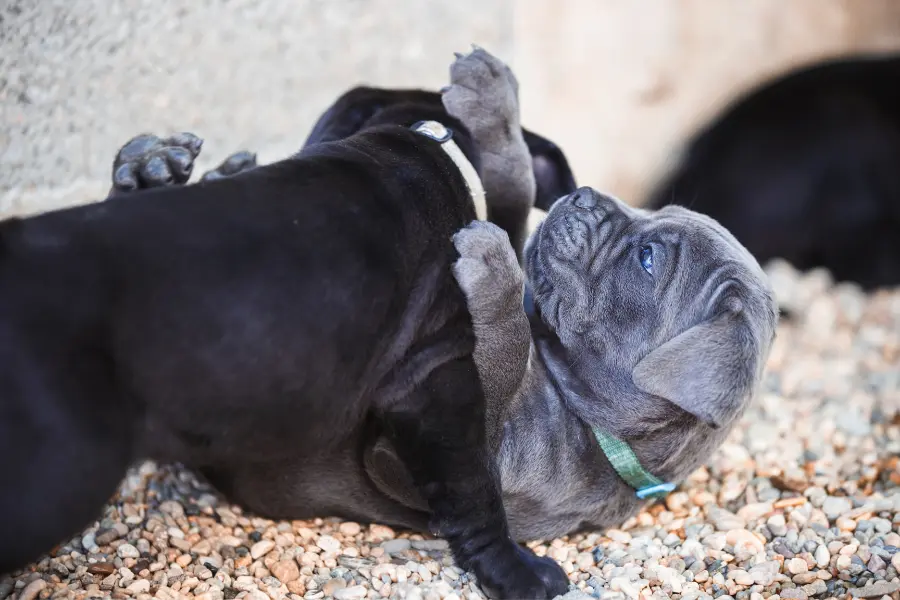
In the fifth week, you should also start socializing your puppies with people, not only with the breeder and his assistant but, if possible, with as many different people as possible. The children are now allowed and should play with the puppies, take them from the kennel, take them to the parks and fields and introduce them to all possible things, in a moderate way and not for too long, of course.
In any case, you should regularly deal with the whole litter, but more and more with each puppy individually. Take the puppy away from the litter somewhere where nothing can distract him and always encourage him to learn.
Playing with a toy provides a variety of learning opportunities: What will happen if we throw the toy? what will the puppy think of it? what will he do? what if we hide it in one place, and then after in another? By playing these games the puppy socializes with the person he’s playing with and acclimates to learning.
*Every game is associated with learning, frequently changing toys and games create new and different learning experiences.
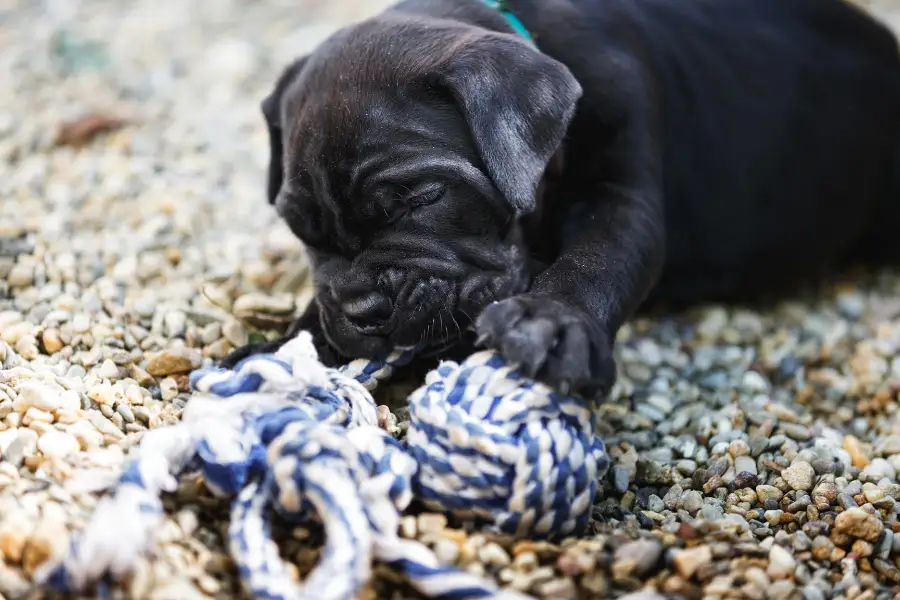
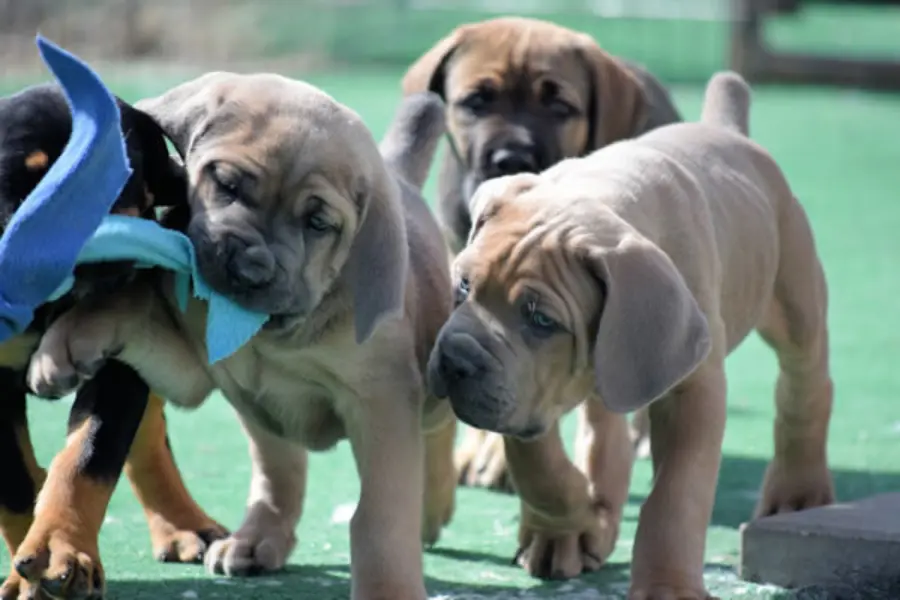
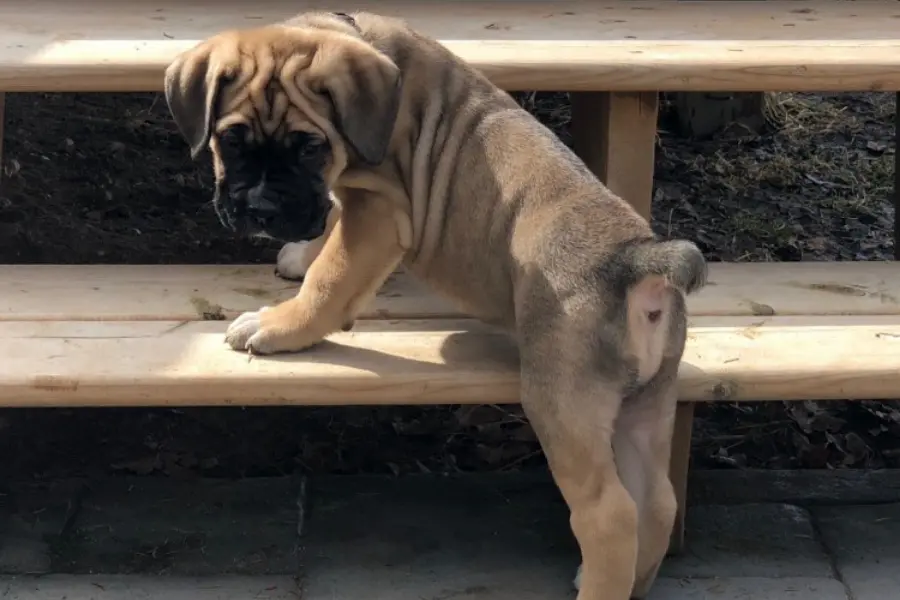
From the Eighth to the Twelfth Week
This is the period when the puppies are handed over to the new owner. The question is: Is it better to take the puppy in the eighth or the twelfth week?
Some breeders see the eighth week as the perfect time to hand over the puppies to the new owner, but other breeders choose the twelfth week. Both are acceptable and have their benefits.
If the puppies stay in the kennel till the twelfth week, they will continue to socialize among themselves. But, as said earlier, the breeder still needs to continue working with each puppy individually. On the other hand, it’s said that an 8-week-old puppy has an easier time bonding with his new owner compared to a 12-week-old puppy.
Another benefit for the new owner is that if you take the Cane Corso puppy at 12 weeks old, is that the breeder will crop the ears and start the puppy vaccination program. This will, of course, increase the price of the puppy.
Also, it’s better to take the puppy at 8-weeks if all the other puppies in the litter have found a new home, and your puppy is left alone with his mother in the kennel.
Ear cropping should be done between the seventh and eighth week of life. This must be done under anesthesia by an experienced veterinarian. The vet will give you a guide and care tips for the weeks ahead, and most vets will give a free follow-up examination.
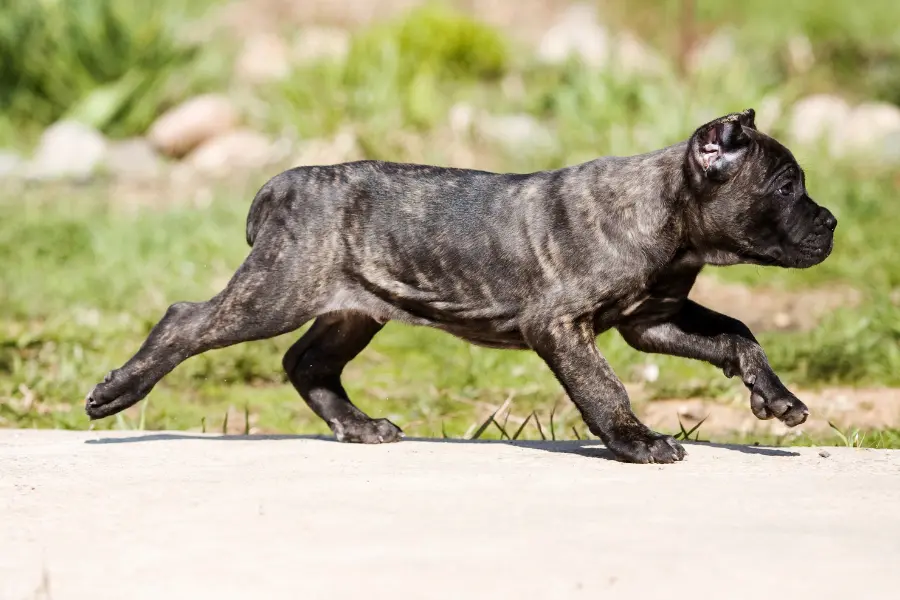
Vaccination and Worming
The first thing to know is that not all dogs have the same puppy vaccination schedule. Factors such as the part of the country in which you live and your dog’s risk factors will be at work. Some dogs do not need all the vaccines. This decision is up to you and your veterinarian.
Here is a generally accepted schedule, but you should always consult your vet.
| Puppy’s Age | Recommended Vaccinations |
|---|---|
| 8th day | Begin heartworm prevention |
| 20th day | Heartworm prevention |
| 6th week | Heartworm prevention, Bordetella #1 |
| 7th week | Distemper/ Hepatitis/ Parainfluenza/Parvovirus (DHPP #1) |
| 8th week | Ear Cropping |
| 10th week | DHPP #2, Bordetella vaccine #2, Heartworm prevention |
| 13th week | DHPP #3, Heartworm prevention |
| 16th week | DHPP #4, Rabies, Heartworm prevention |
Rules for Handling Puppies
As you know now, handling puppies till the age of 8 weeks is a very delicate process, it’s something that requires dedication and seriousness, it’s not enough that you as the owner/breeder know how to deal with puppies of this age, you need to involve and educate your whole family, and everyone who will be in touch with the puppies.
- Only people(both adults and children) who have received instructions from the breeder may “work” with the puppies.
- When working with puppies individually, they need to be taken away from their mother and siblings, in an area without any distractions. His sole focus and attention should be on the person working/playing with him.
- Working or playing with the puppy shouldn’t last longer than 15-30 minutes and should never be apart from the litter for more than an hour. You don’t need to work with the puppies every day, it’s proven that “working” two times a week also accomplishes great results.
- Make sure that the items you use to play with the puppies can’t harm them in any way possible. Toys and games should be switched up frequently. Try to stimulate all five senses, not just vision and touch.
- Don’t force it! Let go of anything that fails to arouse interest in the puppy. If the puppy is not in the mood for playing, stop, and take him back to the litter.
Summary
In the first three weeks, puppies are in a semi-conscious state and their mother can take care of them by herself. At the beginning of the fourth week, their life energy awakens, and it takes them a whole week to get to know and adapt to the environment. Their environment currently consists of the mother and siblings from the litter, the breeder, and the breeder’s family.
Research on the stages of puppy development has shown that socialization with other puppies and humans in this period will lay the foundation of the dog’s character and temperament in later life.
Everything they learn right now will stick like glue, and anything you miss to teach them will be ten times harder in the future.
Eight weeks is the optimum age to hand over the puppy to the new owner, but some breeders choose the twelfth week, and both are adequate.
Related Questions
How much does a newborn Cane Corso puppy weigh? – The average weight of a Cane Corso puppy immediately after birth is about 800 grams or about 1.7 pounds.
How Long Does a Cane Corso Labor Last? – Labour normally lasts 3-12 hours.
How Many Puppies are in a Cane Corso Litter? – Cane Corsos normally have litters of six to ten puppies.
Recent Posts
How Much Does a Cane Corso Cost? Puppy Prices and Monthly Expenses
If you are thinking about getting a Cane Corso puppy, you better know what to expect financially. And I don't just mean what the puppy costs itself. We are talking about all the initial costs, the...
What Defines a Reputable Cane Corso Breeder - Responsible Breeding
Finding a reputable breeder is your first and most important step toward finding the perfect Cane Corso puppy for your family. A reputable breeder is a valuable asset in the journey of Corso...
